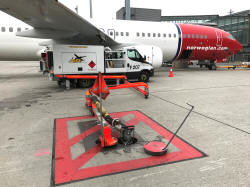Airlines get ready for jet biofuel take-off in Norway
 Send a link to a friend
Send a link to a friend
 [November 22, 2019] By
Lefteris Karagiannopoulos [November 22, 2019] By
Lefteris Karagiannopoulos
OSLO (Reuters) - Airlines are confident of
having sufficient supplies of biofuel-infused jet fuel to comply with a
Norway requirement which takes effect next year, although they warn of
additional costs.
From January, jet fuel suppliers in Norway must blend 0.5% of biofuel in
all their aviation fuel, a policy Oslo hopes will boost supply and
demand and lead to lower CO2 emissions.
Although aviation biofuel suppliers say it can cut the carbon footprint
of airlines by up to 80%, it costs four times as much as normal jet
fuel, which has so far curtailed usage and therefore demand for
increased production.
And not all biofuels are equal when it comes to their environmental
impact, both in production and transportation.
Norway's new rule demands that airplanes refueled in the country use a
product made from waste fats and vegetable oil, although it excludes
palm oil.
"There are not that many suppliers that supply that type of fuel. We
have access and can buy these quantities at this stage. As we go into
the future though we need more," Rickard Gustafson, chief executive of
SAS, told Reuters.

The Scandinavian airline has set its own goal of powering all its
domestic flights, which account for 17% of its total fuel consumption,
with biofuel by 2030.
SAS expects Norway's 0.5% biofuel requirement to mean an additional 3
million euro ($3.33 million) in annual fuel costs.
It said it may source the biofuel it needs from AirBP, BP's specialist
aviation division, and intends to buy more from Sweden's Preem, which is
building new facilities.
But with Sweden and Finland considering following Norway's lead -- all
three say that by 2030 they want to increase aviation biofuel use to 30%
of total refueling -- there is a danger that demand will outstrip
production.
"We have to create the market. There is strong demand for biofuel. But
not enough is produced," Norway's Climate and Environment Minister, Ola
Elvestuen, told Reuters.
Neste and Norwegian utility Statkraft [STATKF.UL] are also developing
new plants, while similar projects have been announced by Air France KLM
and AirBP.
[to top of second column] |

A Norwegian Air plane is refuelled at Oslo Gardermoen airport,
Norway November 7, 2019. REUTERS/Lefteris Karagiannopoulos

Wideroe, a small Norwegian airline, welcomes Norway's requirement but called for
other countries to follow suit.
"As a first step we would like to see national requirements of biofuel being
replaced by international requirements. This would ensure a level playing field
between airlines," it said, adding that it wants to use electric planes by 2030.
However, budget airline Norwegian Air said Norway was creating artificial demand
which, even though it can be met initially, could cause a future fuel squeeze.
"With other (biofuel) volume obligations in the future, we could easily get a
supply shortage," a spokeswoman said.
"In order to fulfil the mandate, imports from other regions might be necessary.
How sustainable is biofuel that has been shipped half way around the world," she
said.
Norwegian Air has been investing in more fuel efficient planes, which should be
encouraged instead, she added.
Some in the airline industry market, including the SAS CEO, said some of the
extra fuel costs may be added to fares.
Despite this, passengers at Oslo airport welcomed Norway's pioneering move.
"I do not mind if it will cost a little bit more. We have to clean up the world
and do what we can do to have cleaner fuel," said 72-year-old Dag Christopherson.
(Editing by Gwladys Fouche and Alexander Smith)
[© 2019 Thomson Reuters. All rights
reserved.] Copyright 2019 Reuters. All rights reserved. This material may not be published,
broadcast, rewritten or redistributed.
Thompson Reuters is solely responsible for this content.
 |